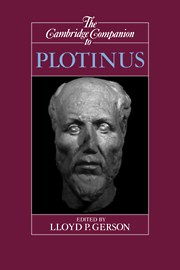Book contents
- Frontmatter
- Introduction
- 1 Plotinus
- 2 Plotinus's metaphysics of the One
- 3 The hierarchical ordering of reality in Plotinus
- 4 On soul and intellect
- 5 Essence and existence in the Enneads
- 6 Plotinus on the nature of physical reality
- 7 Plotinus on matter and evil
- 8 Eternity and time
- 9 Cognition and its object
- 10 Self-knowledge and subjectivity in the Enneads
- 11 Plotinus
- 12 Human freedom in the thought of Plotinus
- 13 An ethic for the late antique sage
- 14 Plotinus and language
- 15 Plotinus and later Platonic philosophers on the causality of the First Principle
- 16 Plotinus and Christian philosophy
- Bibliography
- Index
11 - Plotinus
Body and soul
Published online by Cambridge University Press: 28 May 2006
- Frontmatter
- Introduction
- 1 Plotinus
- 2 Plotinus's metaphysics of the One
- 3 The hierarchical ordering of reality in Plotinus
- 4 On soul and intellect
- 5 Essence and existence in the Enneads
- 6 Plotinus on the nature of physical reality
- 7 Plotinus on matter and evil
- 8 Eternity and time
- 9 Cognition and its object
- 10 Self-knowledge and subjectivity in the Enneads
- 11 Plotinus
- 12 Human freedom in the thought of Plotinus
- 13 An ethic for the late antique sage
- 14 Plotinus and language
- 15 Plotinus and later Platonic philosophers on the causality of the First Principle
- 16 Plotinus and Christian philosophy
- Bibliography
- Index
Summary
Porphyry tells us that he “once went on asking Plotinus for three days about the soul's connection with the body, and [Plotinus] kept on explaining to him. A man called Thaumasius came in who was interested in general statements and said that he wanted to hear Plotinus speaking in the manner of a set treatise, but could not stand Porphyry's questions and answers. Plotinus said, 'But if when Porphyry asks questions we do not solve his difficulties we shall not be able to say anything at all to put into the treatise'” (Life of Plotinus 13.11-18). Porphyry further claims that the works of Plotinus's “middle period” ([22] to [45]), written while Porphyry was with him, were the greatest (Life 6.31-7), but it is difficult to identify any special difference that his questions made (unless that Plotinus wrote at greater length, and yet more tortuously). Plotinus may have reached his convictions by argument, and been prepared to defend them, but what he says at the beginning, in the discourse On Beauty (I.6), is very much what he says at the end, On the Primal Good and the Other Goods (I.7), “When [we] see the beauty in bodies [we] must not run after them; we must know that they are images, traces, shadows and hurry away to that which they image. . . . Shut your eyes and change to and wake another way of seeing, which everyone has but few use” (I.6.8.7-9, 25-7).
- Type
- Chapter
- Information
- The Cambridge Companion to Plotinus , pp. 275 - 291Publisher: Cambridge University PressPrint publication year: 1996
- 2
- Cited by

